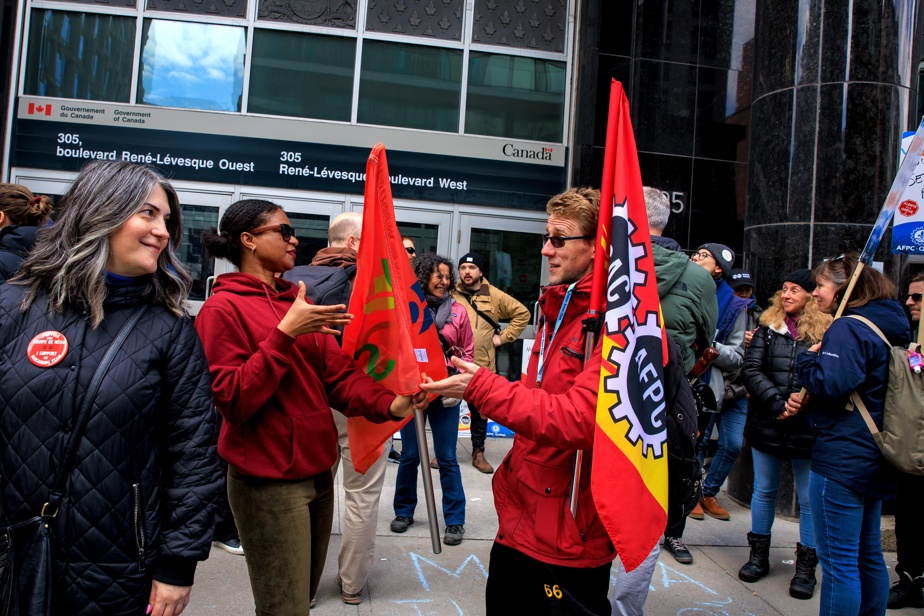(OTTAWA) After a week-long strike, hundreds of federal public servants continued to demonstrate in downtown Montreal on Tuesday morning.
“It’s getting long, I can’t wait to get back to work, [but] I’m not discouraged at all, all good things come with time,” comments Maria McGee, holding up her sign with a Simpsons character on the René-Lévesque Boulevard West. “The offers, to date, do not hold water. With inflation, wages are not enough,” adds his colleague Maria Merlos through the din of plastic trumpets.
“My department said it would take a day. We were confident: taxes start, we have power. But it looks like we don’t have that much power,” said a Canada Revenue Agency employee who asked not to be named. Like most of his colleagues, he is on his fifth working day outside his offices at 305 René-Lévesque Boulevard West. “Until Friday, I will feel good. Afterwards, I’m going to start stressing: are we winning the case? “, he wonders.
A few meters away, Stéphane and Mélissa, Health Canada employees, joined the movement more recently. “In other departments, it was the employer who said, ‘You have the right to protest, this is what will happen’, but in our case, no,” Stéphane laments. “I couldn’t keep seeing this while it was happening outside my windows,” he said, pointing to his office across the boulevard. He joined the strikers last Friday.
Mélissa, who was on sick leave last week, did the same on Monday. “There’s like a spirit of brotherhood, it’s nice,” she says, aware that the population does not necessarily see the situation the same way.
Many motorists nevertheless support the strikers with a honk. Michel Lacroix, on a bicycle, encourages them verbally. “Look at the salary increases that deputies and company presidents give themselves,” says this professor in the literary studies department at UQAM, who was president of his own union from 2018 to 2021. there is no consequence to a strike, it is useless. A strike is to have a balance of power. »
Marie-Josée, citizen services officer at Service Canada, did not stop. Responding to requests from the public, particularly with regard to employment insurance and pensions, it is an essential service. But as she works opposite, she spends her lunch break on the picket line, blowing soap bubbles. “I can do whatever I want during my dinner, it’s legal to come and help the movement,” she smiled. “The more people who say this needs to change, the more likely it is to happen. »
Having planned a family trip with her three young children on May 12, Roxane Ouimet did everything to ensure that the passport of the youngest, born on March 30, was issued on time. But the birth certificate arrived on April 19, the day the union members went on strike. At the passport office where she went the next day, she could not hold back her tears.
“I had all my documents in hand as well as my proof of travel and they never wanted to take my application, my papers. I was again told that May 12 was a long way off and that I still had time, that it is possible to make a passport in 48 hours (for an excess fee of $100…)”, a- she wrote to La Presse. “I’m not ‘against’ the strike, but I’ll be in doubt until we possibly leave,” she said, worried about losing “thousands of dollars” if her flights were canceled.
“I am well aware that the right to strike is a given, but you cannot imagine the collateral damage that a strike at the federal level can cause,” also wrote us Marc Vachon, a Montreal aid worker who is waiting for visas to his wife and 10-year-old son, both of Ethiopian origin. “My little one finishes school in Addis Ababa on June 21, I was hoping for visas by then, now it’s just a dream,” Vachon fumed, recalling that “Ethiopia has become a hell where the Canadian government website warns us in big letters not to set foot”.
New Democratic Party Leader Jagmeet Singh called on Premier Justin Trudeau to get involved on Tuesday. According to him, Treasury Board President Mona Fortier “didn’t do the necessary work” to avert a strike after two years of negotiations. He believes Ottawa should adjust civil servants’ salaries to inflation, but would not comment on whether he approved their request for a 13.5% increase over three years.
Trudeau said he understands the negotiations are “tough,” but said he sees progress. “We will continue to do the important work of achieving something decent, because we know that Canadians deserve and must have the services they need. »

